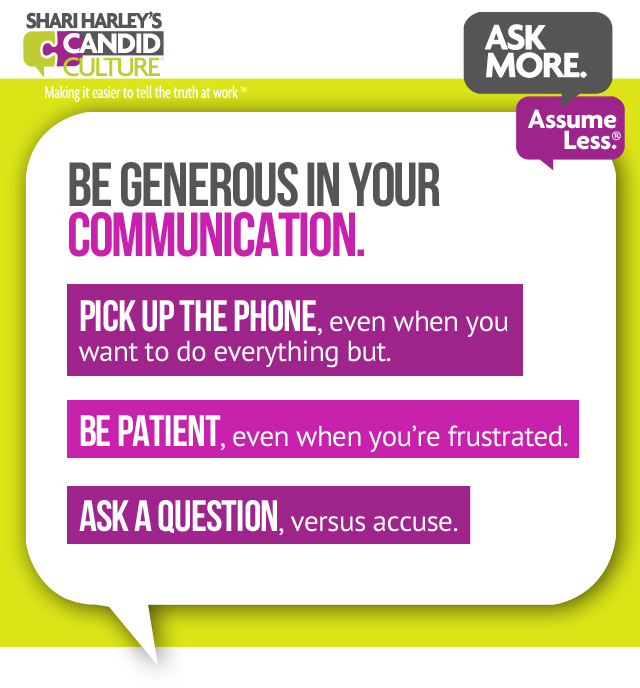Effective Communication in the Workplace – Sometimes You’ll Get It Right and Sometimes You Won’t
As someone who writes and teaches about effective communication in the workplace, I suspect the people I work and live with are expecting me to model good communication skills all the time. The good news: I try really hard to always do the right thing and impact people positively. The bad news, I’m human and sometimes I don’t get it right.
One of the things I’m proud of about Candid Culture, is that we are real people, working with real people. We work very hard to practice effective communication in the workplace and to always model what we’re teaching. And yet, like all people, we get busy, rushed, and tired. We read emails we intend to reply to, but then forget to do so. We occasionally send emails, when we should pick up the phone.
In my world, a good communicator is not someone who always communicates perfectly.

A good communicator who practices effective communication in the workplace is someone who:
- Cares about people and consistently works to communicate in the way others need.
- Asks for and is open to feedback about how they impact people.
- Listens and watches other people’s verbal and non-verbal communication.
- Alters their communication style to meet other people’s needs.
- Takes responsibility when things don’t go well.
I advocate for picking up the phone, even when you want to do everything but, being patient, even when you’re frustrated, and asking questions, versus accusing. And I’m going to admit, I’m working to do these things too. Sometimes I get it right, and sometimes I don’t. I’m in the trenches with you, working to say and do the right things every day.
I promised you five tips to practice effective communication in the workplace and to be generous with people:
- Only call people when you have adequate time, attention, and patience to have whatever conversation needs to be had.
- If you need a few days to return a call, say so. Let the person know when you’ll call.
- Prepare for conversations. Plan what you’re going to say and how you’re going to say it.
- Don’t have hard conversations when you’re frustrated, tired, or busy. They won’t go well.
- If the conversation goes poorly, call back later and clean it up.
Being a good communicator doesn’t mean being perfect. It means caring enough to notice when you miss the mark, cleaning up your messes, and working to do it better next time. I’m working on the above recommendations too. And when I screw it up, you can be assured that my mistakes will become examples in our training programs of what not to do, followed by a new technique that will hopefully work for all of us.



